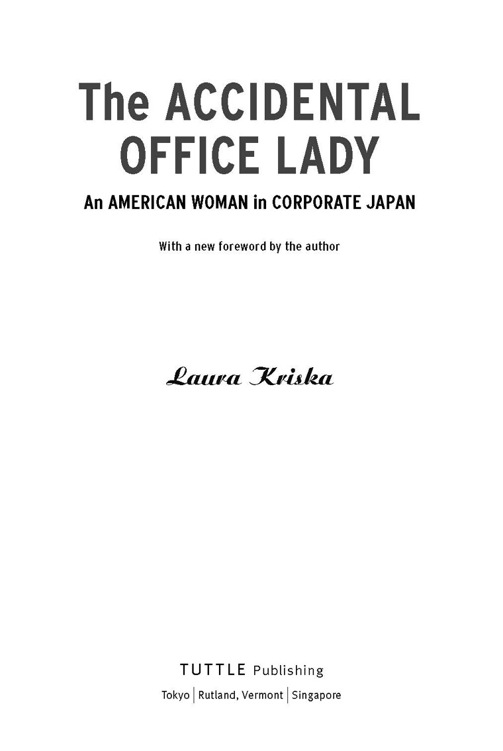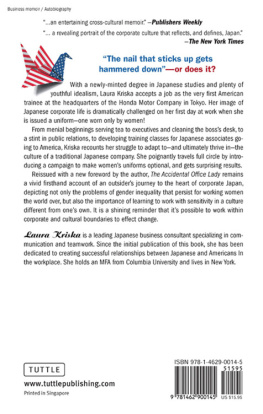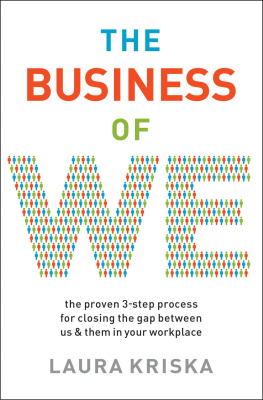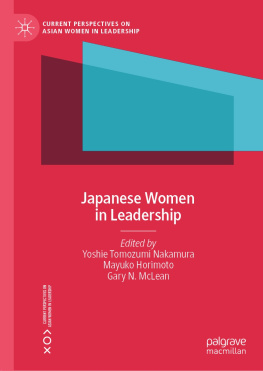

Published by Tuttle Publishing, an imprint of Periplus Editions (HK) Ltd.
www.tuttlepublishing.com
Copyright 2011, 1997 by Laura Kriska
All rights reserved
ISBN 978-1-4629-0014-5
First edition, 1997
Revised edition, 2011
Library of Congress Cataloging-in-Publication Data
Kriska, Laura.
The accidental office lady : an American woman in corporate Japan / Laura Kriska.
p. cm.
ISBN 978-1-4629-0014-5
1. Kriska, Laura. 2. Women executives--United States--Biography. 3. Women executives--Japan--Biography. 4. Corporate culture--Japan. 5. Automobile industry and trade--Japan--Management. 6. Honda Giken Kogyo Kabushiki Kaisha--Biography. I. Title.
HD6054.4.U6K7526 2011
338.7629222092--dc22 [B]
2011001175
Distributed by
North America, Latin America & Europe
Tuttle Publishing
364 Innovation Drive
North Clarendon,
VT 05759-9436 U.S.A.
Tel: 1 (802) 773-8930;
Fax: 1 (802) 773-6993
www.tuttlepublishing.com
Japan
Tuttle Publishing
Yaekari Building, 3rd Floor
5-4-12 Osaki, Shinagawa-ku
Tokyo 141 0032
Tel: (81) 3 5437-0171
Fax: (81) 3 5437-0755
Asia Pacific
Berkeley Books Pte. Ltd.
61 Tai Seng Avenue, #02-12
Singapore 534167
Tel: (65) 6280-1330
Fax: (65) 6280-6290
www.periplus.com
15 14 13 12 11 10 9 8 7 6 5 4 3 2 1 1104TP
Printed in Singapore
TUTTLE PUBLISHING is a registered trademark of Tuttle Publishing, a division of Periplus Editions (HK) Ltd.
To
The Office Ladies
Contents
Acknowledgments
FOR THEIR SUPPORT AND KINDNESS During my time in Japan, I would like to thank Shigeyoshi Yoshida, Mieko Ogiwara, Yumiko Shoji, Hiroko Kanno, Kumiko Hashimoto, Yasuko Kodama, Akiko Onoguchi, Kayoko Furokawa, Ayako Nishiyama, Yoko Sashi, Michio Iwata, Tetsuo Chino, Toshiro Yamada, Moritaka Higuchi, Tom Umeno, Koji Arinami, Rika Takeuchi, Masakazu Iino, Tokiko Iino, Eric Peabody, Bret Anderson, Susan Insley, and Scott Whitlock.
I am also grateful to the following friends and family members who provided encouragement and various kinds of support during the writing of this book: Le Anne Schreiber, Richard Locke, Leila Phillip, Alden Matthews, Laura Grenning, Alex Cox, Bobby Rahal and team, Marcy Mowrey Gauch, Heather Swain, Jiyun Shi, my brother David, my parents Brian and Sally Kriska, and especially Patrick Gunn, Declan, Jaden Li and Mason.
Foreword
MY ORIGINAL INTENT when writing The Accidental Office Lady was to help Americans learn about Japan. With its humble and polite people and seemingly inaccessible language, Japan has always been a hard country for Americans to understand. Yet interest in what was then the second largest economy in the world was high. Since I had been born in Tokyo and attended Waseda University as an exchange student before working in Japan, I wanted to offer my insights to other Americans and contribute to a better understanding of a country that I loved and felt was frequently misunderstood.
Without an academic background or an important job around which to focus my book, I simply wrote about my daily experiences of working in a large Japanese company and living in Tokyo. I did not argue theoretical positions or support particular business strategies and instead described specific encounters that were thrilling, confusing or both. It was only after publishing the book and beginning my career as a consultant that I realized my stories resonated with others. I began to see cultural patterns and tendencies among the people I worked with that helped me make sense of my own early experiences. I continued to broaden my understanding of cross-cultural issues as I listened to first-hand accounts from Japanese, American, Chinese, Indian and many other international professionals engaged in the day-to-day effort of working together.
It was then that I started to understand just how powerfully cultural differences influence the workplace. Different languag-es are an obvious workplace barrier, but different cultural values have a defining impact on the way people communicate, build relationships, make decisions, take risks, build teamwork and more. Although I once considered language the key to success in international relations, I now realize that foreign language skills are secondary to understanding culture.
When I showed up, at age twenty-two, at the Tokyo headquarters of Honda Motor Company on a fine September morning wearing a cream-colored dress-for-success suit and matching pumps, I could say in fluent Japanese, I look forward to a successful work experience in Japan, but I had no idea of what it would take to achieve that success. Even though I had long been interested in Japan and spoke reasonably good Japanese, I still made mistakes because I was deeply and fundamentally American in my way of thinking, my behavior and my understanding of the world. My mouth could form Japanese phrases, but I could not understand the values behind those words because nearly all my life had been spent in Columbus, Ohio, living among other Americans.
What I know now that I didnt know then is that to succeed in another country, especially one as distinct as Japan, it is necessary to see ones own culture as just one way of life and accept that other people will hav e a differentand equally validway of doing things. Perhaps these differences will be obvioussuch as the way people speak or dressbut most of the key cultural differences will be invisible and therefore harder to understand.
As a consultant I have seen sophisticated and skillful American executives who fail to see that Japanese professionals have different cultural values and that these cultural issues matter. These are not casual, isnt-that-interestingcultural details about kimonos or chopsticks. The cultural factors Im talking about are ones that have a meaningful, success-or-failure impact on peoples daily work lives.
For example, one of the cultural topics most frequently mentioned by both Americans and Japanese in my training seminars is style of communication. There is a strong cultural tendency among many Japanese to pause frequently before speaking. Many Americans, especially in the business world, are uncomfortable with silence, so pausing and listening are not valued and practiced skills. Americans also tend to be highly verbal and direct while Japanese tend to utilize non-verbal communication. This culture gap has been well-documented by academics with far better credentials than mine, yet Americans consistently fail to notice this difference and also fail to utilize perhaps the easiest, most effective communication strategy available to them: stop talking and listen!
Failure to pay attention to these meaningful aspects of life in another country is what I have come to identify as cross-cultural laziness. It is the failure to learn about another countrys way of doing things and the failure to find ways to adjust ones own behavior to that cultures way of life. Cross-cultural laziness can take many forms and at its essence is the failure to respect another cultures values.
Looking back over the twenty years since I showed up in that cream-colored suit at Hondas Tokyo headquarters, I see that the story in this book is one about a smart, ambitious, well-meaning yet cross-culturally lazy American trying to make her way in the world beyond the borders of the U.S.A. It is a cautionary tale for young Americans who are about to start their own adventures.
Although many years have passed since that time, the most important lesson of the bookhow to avoid being cross-culturally lazyis more relevant today than ever before because America today is more dependent on other nations than ever before. The trend toward true globalization means that Americans need to develop strong partnerships with people from other cultures, integrate our strengths with those of other nations and share insight and information in a way that contributes to a more peaceful world. And the starting point of these relationships, whether they are between individual tourists or government officials, must be respect and a wish to understand the many cultural factors that exist between different countries in the world.
Next page











